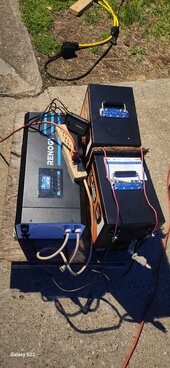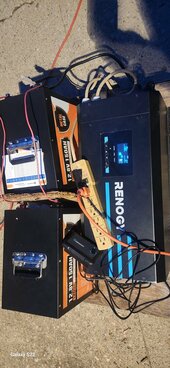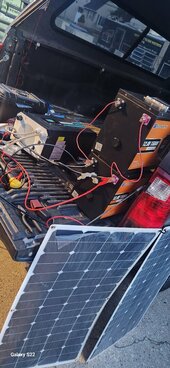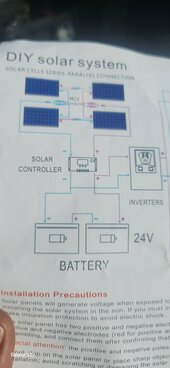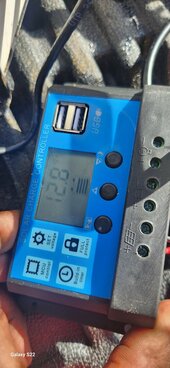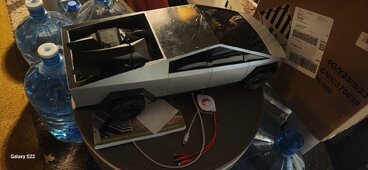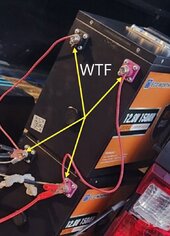Welcome to the DIY Solar Forum
@JuiceBox - we see you are new to solar, will try to help you learn a few important aspects:
So am I wrong? It's working, I have my deep freezer plug up over night.
Your first appliance running off grid.
How long will battery last?
From your photos, you have two parallel 12v 150Ah LFP batteries: together these batteries are 300Ah (300 amp-hours) and since they are Lithium you can expect to use 80 percent of this capacity - unlike Lead-Acid batteries that can not be discharged more than 50% without harm.
If the two batteries were fully charged and you discharge them to 20% you could use 0.8 x 300 = 240Amp hours.
We often discuss Watt-hours instead of Amp hours to avoid needing to know the voltage - your 240 Amp hours at 12v (nominal) is 2880Watt-hours.
If your freezer averages 1kWh per 24 hours, ie 1,000 Watt-hours, then ideal conditions the freezer runs: 2880/1000 = 2.8 days.
I say "ideally" to bring your attention to energy losses in the system will significantly reduce this, your inverter and batteries are not 100% efficient and will use up some of the stored energy just running - even without any loads.
The panels are 1600 watts.
I see two panels in the picture - look on the back of the panel and see what the output rating is - ie 200W is a common small panel, and if you have 8 of these then you have max 1600W of PV possible, however, just like the other equipment, we seldom see full rated PV in use, often it is closer to 75-85% of these values.
Do I need to get a different controller for the Lithium batteries?
The controller you show in the pictures is a very base level PWM controller and no-one on this forum is going to recommend this type of unit. Search the forum for discussions on entry level equipment for 12v SCC Will has a video on this topic for 12v SCC this is from five years ago, however in this segment not too much has changed in the entry level -
What is up with the 12v vs 24v batteries? Is it more power longer or faster or something else?
Something else - Amperage/Current - we could build any sized battery at 12volts but to supply large loads the current (amperage) would be huge. Large amperage needs large conductors, and this is expensive and increasingly difficult when every component must also be capable of safely operating at the high current. Instead of this, we use higher voltages (24, 48 etc) to supply the needed total energy but at a lower current. As general rule of thumb, we often consider systems up to 2kW output as good for 12volt, 2-3kWatt systems at 24volt, and above 3-kWatt use 48volt.
What does amp hours mean?
Amps x hours - a measure of the available stored energy. your 150Ah battery is 1 amp x 150 hours or 150amp x 1 hour or any other combination that multiplies to 150. (but keep in mind you generally don't want to use the full 150Ah of these batteries.)
Can Lithium and acid batteries coexist in a system?
Yes, but not a topic for beginner level in my opinion.
Will or can i add single 24v batteries to this system? If no, why not? What is the difference?
Your picture shows the two 12v batteries in parallel - ie neg to neg and pos to pos. This keeps the system at 12volts. If you connect a 24 volt battery the two existing ones would need to be set up in series - neg to pos between them, with main pos to main neg = 24volts. This would be 24v but 150Ah (no longer 300Ah) but no free lunch: 12v x 300Ah = 3600Wh, 24v x 150Ah = 3600Wh. Rearrangment of the batteries does not majically make new energy, it just changes the voltage.
Diagram... it wouldn't work hooked up like that.
Can i hook the 2 12v batteries up in away to make them 24v Or to make them power or charge different?
Yes, putting two 12v batteries with a wire that joins the neg from one, to the pos of the other will mean the potential across the remaining two poles will now be 24-volt. See above discussion.
Renogy 3000 watt inverter is equally to 25amps?
Max 3000 yes, but this is not top tier equipment and you will be wise to limit to 75% of the max if you want it to last. As noted earlier, best for 12 volt systems to run up to about 2000 watts.
Here is an example of why: 3000 Watts / 12v = 250Amps
250Amps will need a very large wire ga. and all the components in the system will need to be capable of operating at these currents. Your picture shows some small ga wires attached to the batteries, no where near capable of 250Amp without melting or catching fire. Also - your batteries need fuses to cut off a circuit that is carrying higher amperage than the wire is rated for.
Is im right or is im not? probably more questions but my brain fried for the time being.
You are new to this, and asking questions is one way to get up to speed, another is to read over the forum postings on the beginner tab, and watch some of Will Prowse videos from Youtube - especially his early ones - to learn the basics and be able to develop your understanding of how these systems work.
Final note: don't let anyone deter you from learning and asking questions, it is a pretty steep learning curve to get started, but it will all become clear with time and effort.
